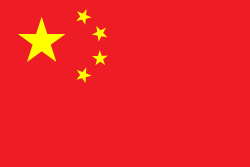| President of the People's Republic of China | |
|---|---|
| 中华人民共和国主席 | |
 | |
 | |
| Style |
|
| Type | State representative [1] |
| Status | National-level official (second-highest ranking official) [a] |
| Reports to | Standing Committee of the National People's Congress |
| Residence | Zhongnanhai |
| Seat | Beijing |
| Nominator | Presidium of the National People's Congress |
| Appointer | National People's Congress |
| Term length | Five years, renewable |
| Constituting instrument | Constitution of China (1982) |
| Precursor | Chairman of the Central People's Government (1949–1954) |
| Formation | 27 September 1954 (current form) |
| First holder | Mao Zedong |
| Abolished | 1975–1982 |
| Deputy | Vice President |
| Salary | CN¥136,620 per annum est. (2015) (USD18,721) [2] |
| |
| President of the People's Republic of China | |||||||
|---|---|---|---|---|---|---|---|
| Simplified Chinese | 中华人民共和国 主席 | ||||||
| Traditional Chinese | 中華人民共和國 主席 | ||||||
| |||||||
| alternative name | |||||||
| Simplified Chinese | (中国)国家主席 | ||||||
| Traditional Chinese | (中國)國家主席 | ||||||
| |||||||
The president of China,officially the president of the People's Republic of China,is the state representative of the People's Republic of China. On its own,it is a ceremonial office and has no real power in China's political system,though since 1993,the post has been concurrently held by the general secretary of the Chinese Communist Party (CCP) and chairman of the Central Military Commission,who is China's top leader. While the office has many of the characteristics of a head of state,the country's constitution does not define it as such.
Contents
- History
- Establishment in 1954
- History up to 1974
- Abolition in 1975
- Restoration in 1982
- Selection
- Eligibility
- Election
- Powers and duties
- Political ranking
- Post title
- Line of succession
- Current line of succession
- List of state representatives
- Chairpeople
- Chairpeople of the Standing Committee of the National People's Congress
- Presidents
- Statistics
- Spouse of the president
- See also
- Notes
- References
- Works cited
The presidency in its current form was the chairman of the Central People's Government of the People's Republic of China,which was established on 1 October 1949 by a decision of the Chinese People's Political Consultative Conference. It was replaced in Constitution in 1954 with the office of state chairman. It was successively held by Mao Zedong and Liu Shaoqi. Liu fell into political disgrace during the Cultural Revolution,after which the presidency became vacant. The post of chairman was abolished under the 1975 constitution,and the function of state representative was bestowed on the chairman of the National People's Congress Standing Committee. The office was reinstated in the Constitution of 1982 but with reduced powers and a stipulation that the president could not serve more than two consecutive terms. The Chinese president was the third to fifth highest-ranking position when it was re-established in 1982. The term limits were abolished in 2018. Since 1982,the title's official English-language translation has been "president",although the Chinese title remains unchanged. [note 1]
The presidency is a part of the system of people's congress based on the principle of unified power in which the National People's Congress (NPC) functions as the only branch of government and as the supreme state organ of power. The presidency is a state organ of the NPC and equivalent to,for instance,the State Council and the National Supervisory Commission,rather than a political office,unlike the premier of the State Council. Together with the NPC Standing Committee,the presidency performs certain functions performed by a head of state in most other countries. The president can engage in state affairs with the consent of the NPC Standing Committee,but has no independent powers other than those bestowed by China's permanent organ. While the presidency is not a powerful organ in itself,since 27 March 1993,the president has concurrently served as general secretary of the Central Committee of the Chinese Communist Party (CCP) and chairman of the Central Military Commission (CMC),making the incumbent China's paramount leader and supreme commander of the armed forces.















